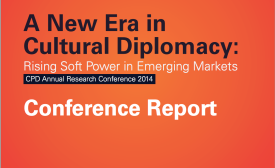Cultural Diplomacy
Throughout Beijing, images of Optimus Prime, Bumblebee, and other protagonists in the latest Transformers film stare from bus station billboards, shopfront windows and even a statue near Tiananmen Square. As US film studios look further afield for profits, the Hollywood sign now looms over China.

CPD's 2014 Research Conference focused on rising cultural diplomacy in emerging economies.
The Russian Cultural Centre in the city celebrated the Day of Family, Love and Faith. The celebration was attended by members of the Russian-Indian Family Club that functions at the Centre. The programme was jointly inaugurated by the president of the Club Kadakampally Sanilkumar and co-chairperson Viktoria Ajay.

Listen to CPD's interview with Roger Kittleson about The Country of Football: Soccer and the Making of Modern Brazil.
The Russian Foreign Ministry and the Federal Agency for the Commonwealth of Independent States, Compatriots Living Abroad and International Humanitarian Cooperation (Rossotrudnichestvo) plan to present a draft version of Russia’s “soft power doctrine" (entitled “Integrated Strategy for Expanding Russia’s Humanitarian Influence in the World”) to President Vladimir Putin before the end of summer.
For the third year, the U.S. State Department is funding the University of Southern California's American Film Showcase, a $3.3 million program that sends American documentary filmmakers and their movies around the world to show them a side of America they may not know.
The 2010 World Cup in South Africa was one of the first glimpses of this new German identity on the international stage. In the eyes of many it represented a modern Germany, free from the shackles of its history, as the center of European affairs and subsequently, highlighting the changing face of race and ethnicity on the continent.
First secretary of the Japanese Embassy in Tehran Tomohiro Nakagaki said that his country is keen to hold another cultural week in Tehran in the near future. He met with Niavaran Cultural Center Director Seyyed Abbas Sajjadi in Tehran, and his plan for holding the cultural week was discussed during the meeting, the center announced in a press release on Monday.







